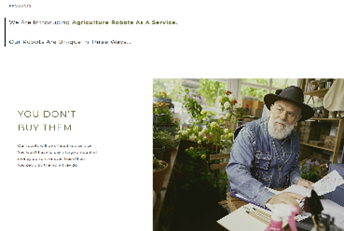
Growers want to find a way to reduce the burden of hard work in the field at a time when they are also facing a significant labour shortage. At the same time, consumers are now demanding higher quality, healthier and more sustainable agricultural products, which can be more easily delivered by using intelligent robots in the field. At a time when the agricultural sector is estimated to consume 50% of Europe's water, studies have shown that the use of robots in spraying operations could reduce water consumption by up to 90%.
The use of robots in agriculture is expected to increase in the coming years as the technology becomes more advanced and cost-effective.
However, it is still relatively limited for the following main reasons:
The “Agriculture Robots as a Service” is responding to all those specific needs and challenges.
The goal of the Agroverse service is to help farmers produce high-quality food, sustainably and effortlessly and reduce the aforementioned main reasons which limit the use of robots.
Agroverse is introducing “Agriculture Robots as a Service”. The robots are offered as a service, the farmer does not buy them, they just pay only the work they do. They won’t have to pay a large amount of money upfront or even lease them. The robots are autonomous. The farmers don’t have to operate, maintain, or service them. Everything is handled by the operator.
Agroverse provides fully autonomous electric and self-powered robots, capable of collecting data on crops and offered as a service to farmers.
By offering agricultural robots as a service, farmers pay for the use of the robots per acre without having to purchase the robots, reducing upfront costs. This makes them more affordable to farmers of all scales, including small-scale farmers.
Robots are used in agriculture and their use is increasing every day as technology develops. They can perform various agricultural tasks such as mechanical weeding, spraying, planting, harvesting and monitoring the health and other parameters of crops. One of the most common types of agricultural robots is the Automated Guided Vehicle (AGV), which performs agricultural tasks in the field in an automated manner without human intervention.
Agroverse's robots perform daily agricultural tasks such as mechanical weeding, spraying, harvesting and other agricultural tasks that typically require planning, time and execution by the farmer. In addition, through the use of sensors, our solution could enable farmers to gain more information about their crops, including potential disease outbreaks and yield predictions. This information could help farmers make more targeted decisions in a more automated way. Specifically, Agroverse's online application will alert the farmer when such indications are present while the robot is working, allowing the farmer to plan the next session. By showing farmers the positive impact that robots can have on crop yields and resource management, it immediately increases the likelihood that they will adopt such technologies. In addition, our solution is independent of local infrastructure, as nothing is required beyond the Agroverse Hub, which acts as a charging station for the robots. The robots are equipped with peripheral cameras and depth sensors that understand the local topography and can therefore adapt to sloping fields as well as dense crops.
In conclusion, the capabilities of our service make it easy to understand that Agroverse is the solution to the most common challenges facing agricultural robots today, with a vision to make it possible for farmers to "buy the rest" they deserve.

Source: https://www.agroverse.tech
Agroverse is methodically addressing the safety issues associated with agricultural robots, as we aim to have robots working in the presence of the farmer or our qualified personnel. Our cameras and sensors then feed our AI algorithms with more data, enabling our robots to avoid obstacles, objects, people and animals. In addition, the inbuilt GPS makes the field boundaries clear to our robots so that they can only enter and use pesticides, fertilisers and other resources within the field boundaries, ensuring their safe operation. The Agroverse application is accessible only through a unique username and password per user and is able to maintain information records such as: work area, resource rate, yield rate per hour, etc.
Website: https://www.agroverse.tech
Email: sales@agroverse.tech
Effie Tsili (CONNEXIONS)
Funded by the European Union. Views and opinions expressed are however those of the author(s) only and do not necessarily reflect those of the European Union or the European Education and Culture Executive Agency (EACEA). Neither the European Union nor EACEA can be held responsible for them.
Project number: 2021-1-DE02-KA220-VET-000034651
All AgriSkills Intellectual Outputs are Open Educational Resources.
Creative Commons Attribution-Non-Commercial-Share-Alike 4.0 International License.
Google Play and the Google Play logo are trademarks of Google LLC.